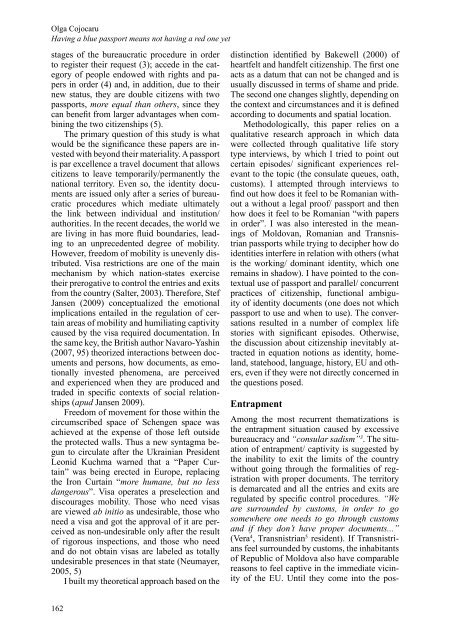State, community, individual - Societal and Political Psychology ...
State, community, individual - Societal and Political Psychology ...
State, community, individual - Societal and Political Psychology ...
Create successful ePaper yourself
Turn your PDF publications into a flip-book with our unique Google optimized e-Paper software.
Olga Cojocaru<br />
Having a blue passport means not having a red one yet<br />
stages of the bureaucratic procedure in order<br />
to register their request (3); accede in the category<br />
of people endowed with rights <strong>and</strong> papers<br />
in order (4) <strong>and</strong>, in addition, due to their<br />
new status, they are double citizens with two<br />
passports, more equal than others, since they<br />
can benefi t from larger advantages when combining<br />
the two citizenships (5).<br />
The primary question of this study is what<br />
would be the signifi cance these papers are invested<br />
with beyond their materiality. A passport<br />
is par excellence a travel document that allows<br />
citizens to leave temporarily/permanently the<br />
national territory. Even so, the identity documents<br />
are issued only after a series of bureaucratic<br />
procedures which mediate ultimately<br />
the link between <strong>individual</strong> <strong>and</strong> institution/<br />
authorities. In the recent decades, the world we<br />
are living in has more fl uid boundaries, leading<br />
to an unprecedented degree of mobility.<br />
However, freedom of mobility is unevenly distributed.<br />
Visa restrictions are one of the main<br />
mechanism by which nation-states exercise<br />
their prerogative to control the entries <strong>and</strong> exits<br />
from the country (Salter, 2003). Therefore, Stef<br />
Jansen (2009) conceptualized the emotional<br />
implications entailed in the regulation of certain<br />
areas of mobility <strong>and</strong> humiliating captivity<br />
caused by the visa required documentation. In<br />
the same key, the British author Navaro-Yashin<br />
(2007, 95) theorized interactions between documents<br />
<strong>and</strong> persons, how documents, as emotionally<br />
invested phenomena, are perceived<br />
<strong>and</strong> experienced when they are produced <strong>and</strong><br />
traded in specifi c contexts of social relationships<br />
(apud Jansen 2009).<br />
Freedom of movement for those within the<br />
circumscribed space of Schengen space was<br />
achieved at the expense of those left outside<br />
the protected walls. Thus a new syntagma begun<br />
to circulate after the Ukrainian President<br />
Leonid Kuchma warned that a “Paper Curtain”<br />
was being erected in Europe, replacing<br />
the Iron Curtain “more humane, but no less<br />
dangerous”. Visa operates a preselection <strong>and</strong><br />
discourages mobility. Those who need visas<br />
are viewed ab initio as undesirable, those who<br />
need a visa <strong>and</strong> got the approval of it are perceived<br />
as non-undesirable only after the result<br />
of rigorous inspections, <strong>and</strong> those who need<br />
<strong>and</strong> do not obtain visas are labeled as totally<br />
undesirable presences in that state (Neumayer,<br />
2005, 5)<br />
I built my theoretical approach based on the<br />
162<br />
distinction identifi ed by Bakewell (2000) of<br />
heartfelt <strong>and</strong> h<strong>and</strong>felt citizenship. The fi rst one<br />
acts as a datum that can not be changed <strong>and</strong> is<br />
usually discussed in terms of shame <strong>and</strong> pride.<br />
The second one changes slightly, depending on<br />
the context <strong>and</strong> circumstances <strong>and</strong> it is defi ned<br />
according to documents <strong>and</strong> spatial location.<br />
Methodologically, this paper relies on a<br />
qualitative research approach in which data<br />
were collected through qualitative life story<br />
type interviews, by which I tried to point out<br />
certain episodes/ signifi cant experiences relevant<br />
to the topic (the consulate queues, oath,<br />
customs). I attempted through interviews to<br />
fi nd out how does it feel to be Romanian without<br />
a without a legal proof/ passport <strong>and</strong> then<br />
how does it feel to be Romanian “with papers<br />
in order”. I was also interested in the meanings<br />
of Moldovan, Romanian <strong>and</strong> Transnistrian<br />
passports while trying to decipher how do<br />
identities interfere in relation with others (what<br />
is the working/ dominant identity, which one<br />
remains in shadow). I have pointed to the contextual<br />
use of passport <strong>and</strong> parallel/ concurrent<br />
practices of citizenship, functional ambiguity<br />
of identity documents (one does not which<br />
passport to use <strong>and</strong> when to use). The conversations<br />
resulted in a number of complex life<br />
stories with signifi cant episodes. Otherwise,<br />
the discussion about citizenship inevitably attracted<br />
in equation notions as identity, homel<strong>and</strong>,<br />
statehood, language, history, EU <strong>and</strong> others,<br />
even if they were not directly concerned in<br />
the questions posed.<br />
Entrapment<br />
Among the most recurrent thematizations is<br />
the entrapment situation caused by excessive<br />
bureaucracy <strong>and</strong> “consular sadism” 3 . The situation<br />
of entrapment/ captivity is suggested by<br />
the inability to exit the limits of the country<br />
without going through the formalities of registration<br />
with proper documents. The territory<br />
is demarcated <strong>and</strong> all the entries <strong>and</strong> exits are<br />
regulated by specifi c control procedures. “We<br />
are surrounded by customs, in order to go<br />
somewhere one needs to go through customs<br />
<strong>and</strong> if they don’t have proper documents...”<br />
(Vera4 , Transnistrian5 resident). If Transnistrians<br />
feel surrounded by customs, the inhabitants<br />
of Republic of Moldova also have comparable<br />
reasons to feel captive in the immediate vicinity<br />
of the EU. Until they come into the pos-


